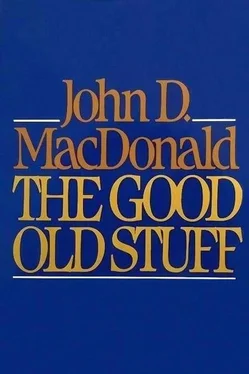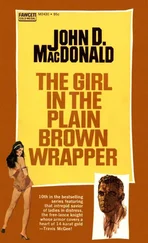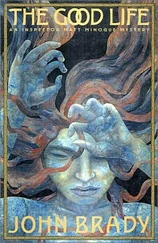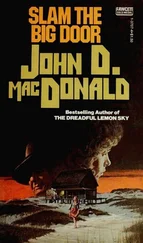He had scrubbed his body with harsh yellow soap at the mission and put on the suit and shoes from the Salvation Army. There was no money in the bank. The house had been sold, the money spent.
Two days later, in spite of his weakness, Brasher had hired him, sensing that here was a man whose spirit was so far gone that he would accept without question the long hours and the small pay.
He had gone to work in the yard, learning dully what was expected of him. The heavy sheets and plates cut into his soft flesh through the canvas gloves, and he could work for only an hour at a time before weakness hit him.
Brasher had given him an advance, and with it he rented a cheap room and bought food his stomach could retain.
At the end of a month his eyes were clearer and the moments of weakness came less often. During the second month he began to fill out, and with a thick, stubborn pride in the strength that had come back to him, he punished his body, working at high tempo so that at the end of the day he could fall exhausted into bed, into dreamless sleep.
For a time one of the office men brought his orders into the yard, copies of the material shipped in and the manner in which it should be sorted. Gradually he became conscious of the fact that it was a girl who came out with the orders, and that each time she came she smiled at him and that he liked the way she walked and smiled.
No longer could he completely exhaust his body with the day’s work, and in order to fill his evenings, to keep from remembering, he went to dull movies, sat in his room, and read books, fighting against the face of Caree that threatened to come between his eyes and the printed page.
One night he grew tired of fighting, and when the face came before his eyes he saw that it wasn’t the face of Caree, but the face of the girl who brought the orders out to him as he worked in the yard.
The next day he asked her clumsily to have dinner with him, and to his relief she acted neither coy nor haughty. She accepted with pleasure, and later, as they sat over coffee and she told him about herself, he realized that at last he had begun to heal.
He found out that she knew all about him from one of the girls in the office whose brother worked in Identification at headquarters. He had tried to tell her one night, and she had stopped him and said that she knew about it and it was probably better if he didn’t talk about it until some day when it would be easier.
She became a habit, and more than a habit. She became as necessary to him as warmth and food and shelter. And yet he was awkward and uncertain with her. He felt as though somehow, in the past, his soul had been dug out of him with a hasty spoon and the bits and fragments of it left inside him were too few to offer to anyone.
And, as he was gradually coming back to life, as each night he managed to be more cheerful, less strained, she walked out of the doorway and moments later the wind plucked the orders out of her limp hand, danced them over the piles of scrap, and plastered them flat against the wire mesh of the fence.
Brock said, “I was standing in this exact spot. Here is the sheet that I had picked up when I saw her coming. I was going to carry it over and lay it on that pile over there, but when I saw her coming, I put it down and waited. John, you’re standing exactly where she was when the slug hit her. She came toward me, her head tilted back with the force of the blow, her right side turning half toward me. She landed on her side on that pile of copper scrap and bounced off. She lay with her cheek against the dirt, her face turned away from the scrap pile.”
“How was she facing when it hit her?”
“I couldn’t be sure. You see, with the junk about here, she didn’t come on a straight line but sort of picked her way through on a zigzag. If I had to guess, I’d say that she was heading almost directly at me, turned maybe a little to her left.”
Maclaren took off his soft felt hat and scratched his thinning hair. He looked back at the direction from which the slug, and Stella Galloway, had come. He said, “What happened to your head, Jud? That shot was fired either from the back end of the office building, the far end of the shop, or from behind one of the piles of scrap. If you’d been on your toes...”
Brock managed a tight grin. “Since when does a police officer get to call a lush by his first name?”
Maclaren looked angry for a moment and then sighed. “The hell with scrapping, Brock. Did the shot seem far away?”
“Somewhere between maybe sixty and a hundred feet from me. Not much farther. You can’t hit anything with a forty-five much farther than that. I figure that because she was between me and the pistol, or whatever it was, if it had been much over a hundred feet, I’d have seen her lurch before I heard the shot. As it was, the two things happened at the same instant.”
Horowitz said softly, “That makes sense.” He drifted over to Maclaren and whispered in his ear.
Maclaren stared at Brock for a few moments. He said, “Any chance that somebody was gunning for you and hit the young lady by mistake?”
It was a new thought. Brock said, “Could be, but somehow I don’t think so. I haven’t made any enemies lately, and if somebody wanted to knock me off for old stuff, they could have had me while I was... on the town.”
“Maybe somebody didn’t like the girl being friendly with you and wanted to knock you off and hit her instead. She mention any ex-boyfriend?”
“Told me of a few locals who had made passes. One guy works here that she used to know. Fellow named Hodge Oliver.”
“Where was he when Galloway was shot?”
“You’ll have to get the stories on that. I haven’t had a chance to check on anybody.”
Maclaren walked close to him and looked full into his eyes. “Okay, Brock,” he said gently. “I don’t know your angle, but Brasher says you represent the company in this so we’ll deal with you, even if I don’t like it. Just get one thing clear in your mind. When you were on the force you liked to bang off on angles of your own. Don’t try it this time. Don’t get in our way, and do just what we ask you to do. Understand?”
“You need me for anything right now?” Brock asked.
Maclaren shook his head. Brock went to his locker, changed into street clothes, and took a taxi to the hospital.
The intern said, “Galloway? Doing very nicely. Very nicely.”
“Don’t give me customer talk, friend, I represent the company, private investigation. I asked you how she is.”
The intern shrugged. “She’s all chopped to hell inside. The slug hit flat against her shoulder blade and smashed it. The lead split into two hunks. One went up through the top of her right lung and stopped just under the skin. The other hunk sliced down through her lung and belly, perforated her intestines twice, and came out just above the left hip. A hunk of the shoulder blade was driven over against her spinal cord, and we don’t know what damage that did. She just came out of the operating room ten minutes ago. We gave her two transfusions, and she’ll probably need another. Providing there’s no spinal injury, she’s in bad enough shock so that she’s got maybe one chance in ten of lasting through the next twelve hours. There’s a cop in her room with her just in case she comes out of it. I just gave a full report of her condition to Police Headquarters.”
“Did she recover consciousness in the ambulance or before the anesthetic?”
“No. You want to look at her?”
“Sure.”
The elderly patrolman who sat next to the bed with a notebook and pencil in his hand and a bored look on his face changed the look to quick recognition and then distaste when Jud Brock walked in.
“Relax, Jones,” Brock said. “I just want a look at her.”
Читать дальше












